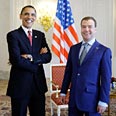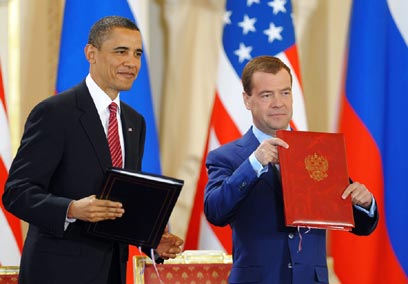
Obama and Medvedev sign disarmament treaty
Agreement to cut strategic nuclear arsenals deployed by former Cold War foes by 30 percent within seven years. 'Russians are already committed to holding Iran accountable through the multilateral sanctions regime,' deputy National Security Adviser Rhodes says
The United States and Russia signed a landmark disarmament treaty on Thursday they hope will herald better bilateral ties and raise pressure on countries seeking nuclear weapons to renounce such ambitions.
Presidents Barack Obama and Dmitry Medvedev signed the pact at a ceremony in the mediaeval Prague Castle after talks that covered nuclear security, Iran's atomic program and an uprising in the strategic Central Asian state of Kyrgyzstan.
The agreement will cut strategic nuclear arsenals deployed by the former Cold War foes by 30 percent within seven years but leave each with enough to destroy the other.
Both major nuclear powers needed to show they were serious about reducing their vast stockpiles to lend weight to efforts to curb the atomic ambitions of countries such as Iran and North Korea, and avoid accusations of hypocrisy.
Today is an important milestone for nuclear security and nonproliferation, and for US-Russia relations," Obama said.
Medvedev hailed the signing as a historic event that would launch a new chapter of cooperation between the countries.
White House officials told reporters on Obama's flight to Prague that tougher UN sanctions against Iran's disputed nuclear program would be prominent in his talks with Medvedev, although no specific announcements were expected.
"The Russians are already committed to holding Iran accountable through the multilateral sanctions regime," deputy National Security Adviser Ben Rhodes said.
The situation in Kyrgyzstan, where opposition protesters forced out President Kurmanbek Bakiyev on Wednesday, thrust its way on to the agenda as both Washington and Moscow have military bases in the poor Central Asian state. The US base at Manas is vital for supplying NATO forces in Afghanistan.
Russian Prime Minister Vladimir Putin effectively recognized the interim Kyrgyz government formed by opposition leader Roza Otunbayeva on Thursday, speaking to her by telephone, his spokesman said. There was no immediate word on whether Washington would follow suit.

US, Russia leaders present new treaty (Photo: AFP)
Obama this week announced a shift in US nuclear doctrine, pledging never to use atomic weapons against non-nuclear states, as he sought to build momentum for an April 12-13 nuclear security summit in Washington.
The US president set out his long-term goal to work towards a world without nuclear weapons in a speech at the same Prague Castle a year ago.
Medvedev said on arrival on Wednesday that the treaty could play a considerable role in shaping disarmament in the future.
White House spokesman Robert Gibbs said Obama hoped and expected the US Senate would ratify the treaty this year, before mid-term elections may change the composition of the upper house of Congress, controlled by the Democrats.
Analysts expected Obama to use the signing to build pressure on Tehran, along with the nuclear summit in Washington and a meeting with Chinese President Hu Jintao next week.
Steven Pifer, an arms control expert at the Brookings Institution, said the pact with Russia would give the US delegation more credibility at the non-proliferation conference.
"If the United States and Russia were to show up with no agreement and between the two of them controlling 95 percent of the weapons, it's pretty easy for the non-nuclear states to say, 'well you're not doing your part, why should we?'," Pifer said.
Obama's new nuclear strategy document broke with former President George W. Bush's threat of nuclear retaliation in the event of a biological or chemical attack.
The assurance applies only to countries in compliance with the nuclear Non-Proliferation Treaty, so Iran and North Korea would not receive that commitment.
Washington and Moscow have plenty of differences on issues ranging from Iran to missile defense.
On Tuesday, Russian Foreign Minister Sergei Lavrov repeated Moscow's threat to withdraw from the START II treaty if US plans for missile defense threatened Russia.
Obama has put a priority on trying to "reset" relations with Moscow that hit a post-Cold War low during Russia's 2008 war with Georgia, and the treaty could help that.
The successor to the 1991 Strategic Arms Reduction Treaty would limit operationally deployed nuclear warheads to 1,550, down nearly two-thirds from START I. However, it does not limit shorter-range tactical nuclear weapons.
Later on Thursday, Obama will dine with 11 heads of state from central and eastern Europe. Czech diplomats said the meeting was designed to reassure former Soviet bloc countries that resetting relations with Russia would not diminish US interests in the region.
Reuters and AP contributed to the report















